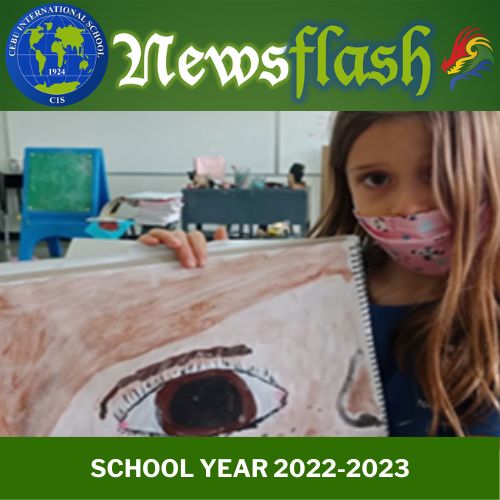
Principal’s Corner
by Mr. Andrew Powell, EY-12 Principal
Experiential learning is an important component of the programs that we offer at CIS. In very simple terms, it can be defined as the process of learning by doing. We believe that by engaging students in hands-on experiences and reflection, they are better able to connect theories and knowledge learned in the classroom to real-world situations.

You will note from the contributions to this week’s Newsflash that our students engage in this in varying ways as they move through the school. There are examples from our young artists and photographers, along with an article on the way in which we promote Mathematical Mindsets in the Middle Years Programme (MYP). Our Senior students also feature in this week’s Newsflash as they share the process and results of their self-initiated exploration of a topic of their choice for the Extended Essay.
Throughout the school, our teachers and students are guided by an inquiry cycle that guides teachers and learners beyond the development of a series of activities and towards a more thoughtful process that assists students to move from the known into the unknown, and as such, engage in the deeper exploration of knowledge and understanding.
This process is also paired with Kolb’s theory of experiential learning, which involves concrete experience, reflective observation, abstract conceptualization, and active experimentation. This process couldn’t have been better modeled by our Grade 12 Art class last week as some of the students delved deeply into each other’s artwork in preparation for the opening of their Art exhibition on February 8th. The depth of thought, action, and the ability to articulate the active conceptualization of abstract concepts were incredible. It also serves to underscore the talents of our students and teachers, as well as the effectiveness of our program.
Experiential learning encourages cooperation and enables students to engage in the development of creative solutions to problems. Next week we will also showcase a taster of one of the Grade 10 Personal Projects in which a student has programmed over 800 lines of code to solve a Rubik’s Cube puzzle from any position in under five seconds.
In closing, I’d also like to recognize our ISAC athletes that traveled to Subic Bay for the football and basketball competitions last week. I know that they return much better for the experience both as athletes and people. There was overwhelming agreement from all schools involved that our students conducted themselves especially well and were the standout team when it came to positive attitudes and getting along with others. Our basketball team battled valiantly while the football team came second overall due to a last-minute goal in the final.

We should be especially proud of these players’ characters and performance. Congratulations on your efforts!
Upcoming events of note
- Feb 13-20: G12 Mock Exams
- Feb 14-17: Week Without Walls
- Feb 23: School Holiday
- Feb 24: Cebu City Charter Day (Public Holiday)
- Feb. 28: CIS-PTA Coffee Morning
Please refer to the CIS Event Calendar for the complete calendar of school events.
PYP Arts
by Mr. Fher Jun Guiritan, PYP Art Teacher
What is the rule of thirds?
The rule of thirds is a composition guideline that places your subject in the left or right third of an image, leaving the other two thirds more open. While there are other forms of composition, the rule of thirds generally leads to compelling and well-composed shots.
In this Unit, the Grades 4 and 5 are learning the basics of photography. There are seven basic elements of photographic art: line, shape, form, texture, color, size, and depth. As a photographic artist, your knowledge and awareness of these different elements can be vital to the success of your composition and help convey the meaning of your photograph.
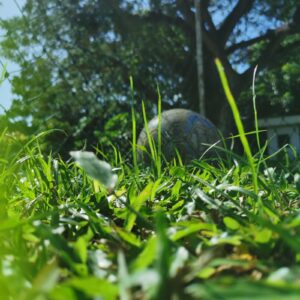
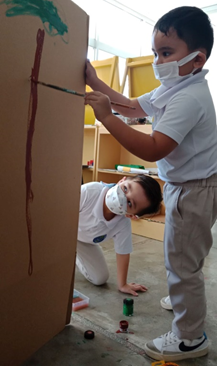 The EY2/3 students are so diligent in painting a tree using poster paint on their big box to be used as the main background for their forest nature habitat diorama.
The EY2/3 students are so diligent in painting a tree using poster paint on their big box to be used as the main background for their forest nature habitat diorama.
Mixed media gives the flexibility for newer materials in conjunction with older materials to be explored, and a wider range of products, arts and crafts can be created.
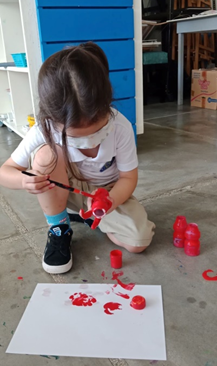
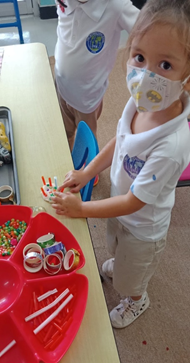
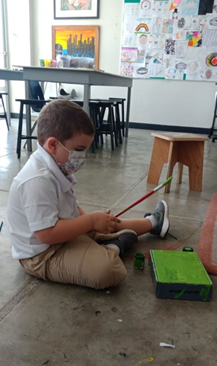
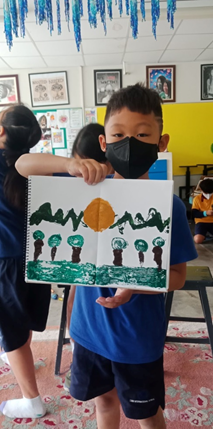
Grades 2 and 3 are exploring symmetry, scale, and proportion in art. Balance is an even use of elements throughout a work of art. Symmetry is a very formal type of balance consisting of mirroring portions of an image.
Grade 3 students working on some simple exercises on symmetry.
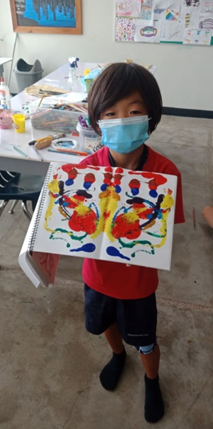
This student is still working and painting the right eye of her sister, making sure she applies the right proportions to the eye and the nose.
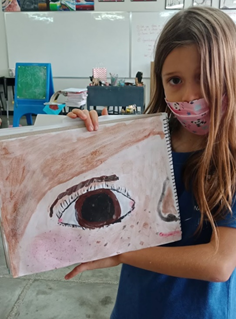
The grade 2 and 3 students are learning about picture planes – foreground, middleground, and background.
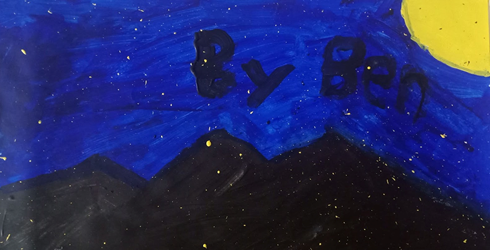
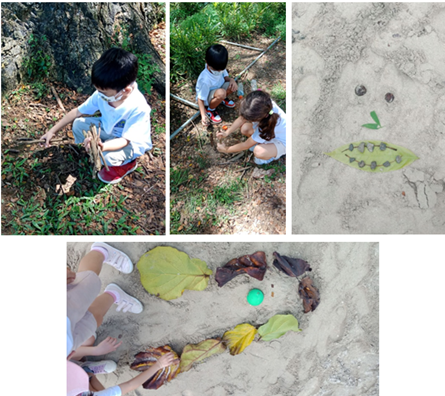 Do you look to get outside and make art? Our K/G1 students do!
Do you look to get outside and make art? Our K/G1 students do!
These students are having so much fun collecting natural materials that can be found at school and with some imagination, created an image that they had in their minds.
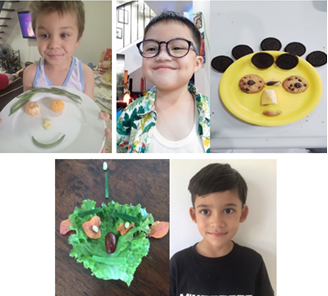 What better way to make a self-portrait using only natural materials than using those that can be found in the kitchen?
What better way to make a self-portrait using only natural materials than using those that can be found in the kitchen?
Mathematical Mindsets
by Mr. Jon Denton, Assistant Principal-MYP
Last week parents were invited to a workshop that looked at the “revolution” that is happening in the way Mathematics is being taught in the classroom. We started the morning by discussing our own experiences with Mathematics. With participants from China, Korea, Japan, Australia, New Zealand and the Philippines the experiences were diverse in some aspects, but interestingly, strikingly similar in others.
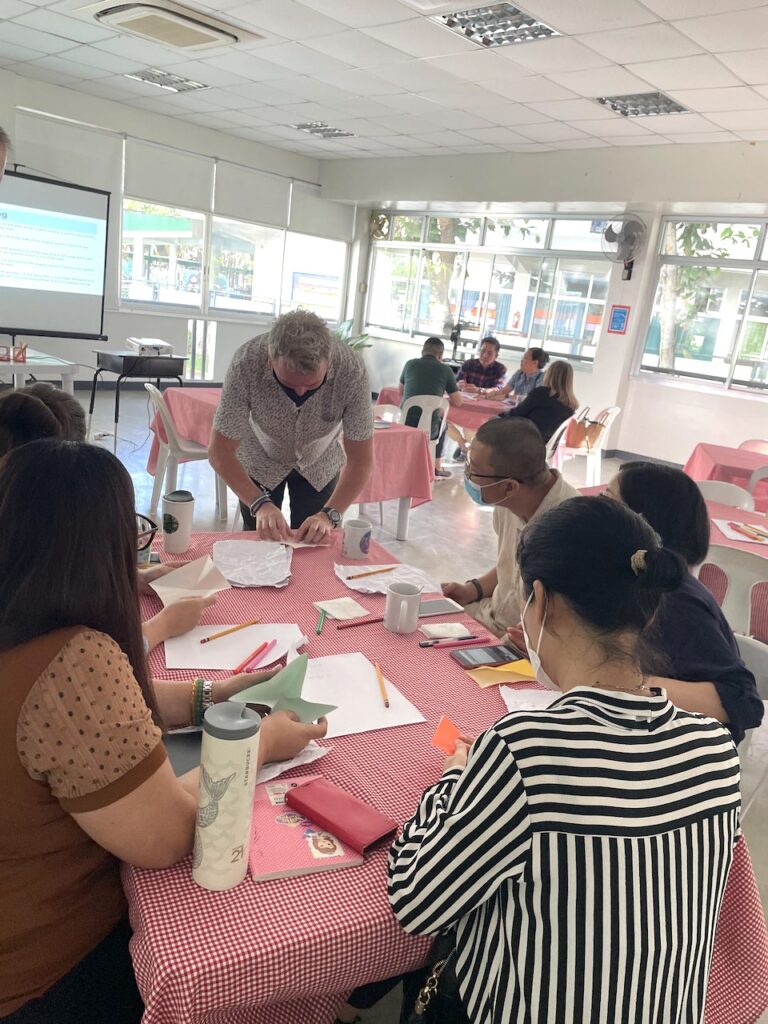 The goal of the meeting was to illustrate how everyone can be successful in Mathematics, there is no such thing as a “maths person”. We explored how Mathematics can be a wonderfully creative subject about creating solution paths that others can see, discuss, and critique. Most importantly, we discussed how depth is much more important than speed – a Maths class is about learning, not performing.
The goal of the meeting was to illustrate how everyone can be successful in Mathematics, there is no such thing as a “maths person”. We explored how Mathematics can be a wonderfully creative subject about creating solution paths that others can see, discuss, and critique. Most importantly, we discussed how depth is much more important than speed – a Maths class is about learning, not performing.
The following three activities are from Jo Boaler’s wonderful You Cubed website (linked below). Each of these is a “low floor high ceiling” task where anyone has the ability to begin the activity, and work at their level, while also being able to extend to higher levels of mathematical understanding.
The first task, “Paper Folding”, explores our understanding of surface area while also developing mathematical reasoning. Participants are asked to build shapes and then justify their findings through mathematical facts and reasoning.
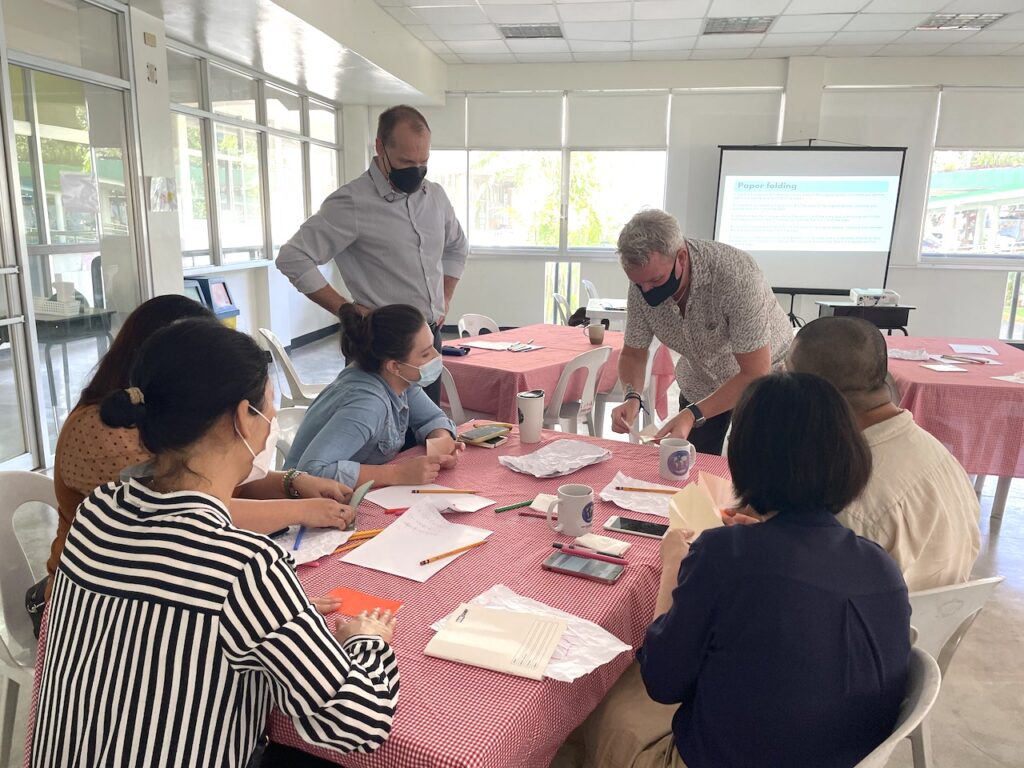
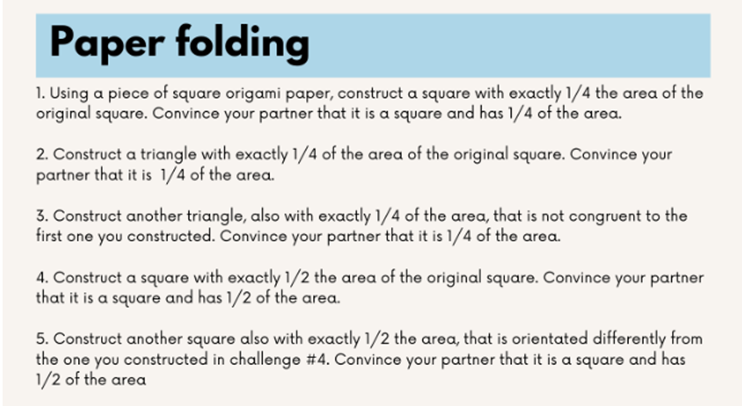
The second is a group task all about exploring patterns. It is “low floor” in 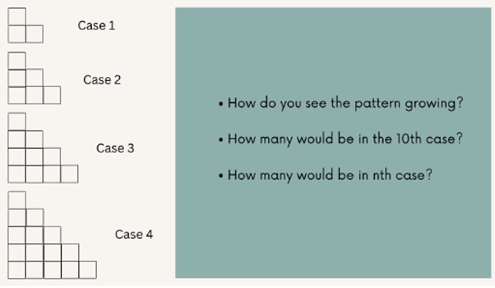 the sense that everyone is able to see how the pattern is growing and would be able to describe or show others in the group. The interesting aspect is that some may see it grow in different ways than others. There are multiple ways to solve problems in Mathematics, which is why it is very much a creative subject. The task gets more challenging as we are asked to predict and then verify how many squares would be in the 10th case. This problem is “high ceiling” as you could discuss what would the pattern look like in the cases of 0 and -1.
the sense that everyone is able to see how the pattern is growing and would be able to describe or show others in the group. The interesting aspect is that some may see it grow in different ways than others. There are multiple ways to solve problems in Mathematics, which is why it is very much a creative subject. The task gets more challenging as we are asked to predict and then verify how many squares would be in the 10th case. This problem is “high ceiling” as you could discuss what would the pattern look like in the cases of 0 and -1.
The final task I will share is a simple one that works with the order of operations. You need to find all the numbers from 1 to 20 using only four 4s and any operation. It is up to you to make it as challenging as you want.
For Example
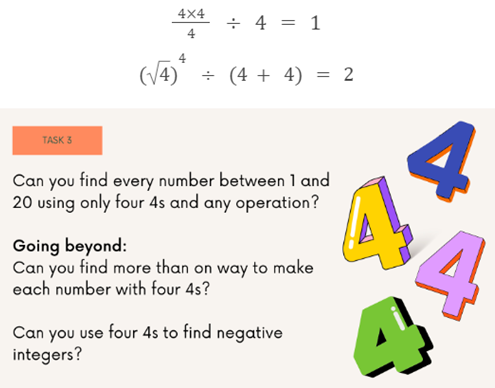
Recommended websites:
- You Cubed offers a lot of free resources and activities – https://www.youcubed.org/tasks/
- NRich Mathematics is an excellent source – https://nrich.maths.org/
- Illustrative Mathematics is an all-time favourite of mine – https://hub.illustrativemathematics.org/s/
- Desmos Classroom has plenty of fun activities – https://teacher.desmos.com/
Extended Essay Cafe
by Ms. Emily Cornet, IB Coordinator
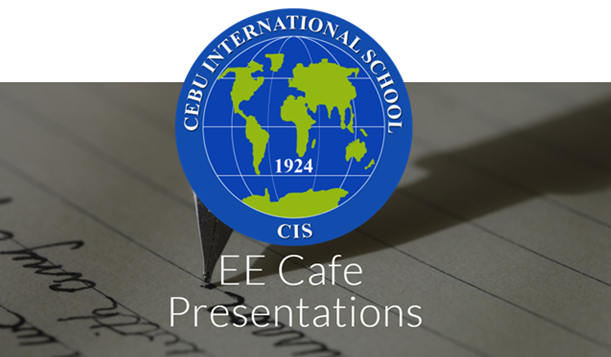
One of the major pieces of the IB Diploma Programme is the Extended Essay (EE) – a 4,000 word essay which students embark upon during Grade 11, and complete in the first semester of Grade 12. During this journey, students must identify a topic/subject, develop their own research question, conduct academic research, and then write the paper. Students work with a supervisor throughout their process in order to stay on track, get feedback, and maintain their motivation.
Earlier this week, CIS Grade 12 students participated in the annual EE Cafe, where they prepared presentations of their journey to share with fellow students, parents and families, and faculty/staff. These presentations were displayed on a website so that audience members could return to them at another time. During Homeroom, the Grade 10s, Grade 11s, and Grade 12s all had the opportunity to watch the videos and give feedback on what they learned from each.
This particular group of Grade 12 students underwent much more complicated circumstances than previous groups as they started Grade 11 still attending remote classes online, shifted to offline work in the aftermath of Typhoon Odette, returned to online classes, before finally being able to come back to face-to-face classes. Our students are to be commended for their hard work and dedication as they continue to strive towards completing their journey through the Diploma Programme.
Chiara
Hyein
Bella
College/Careers Counselor Corner
by Ms. Jenny Basa, College/Careers Counselor Corner
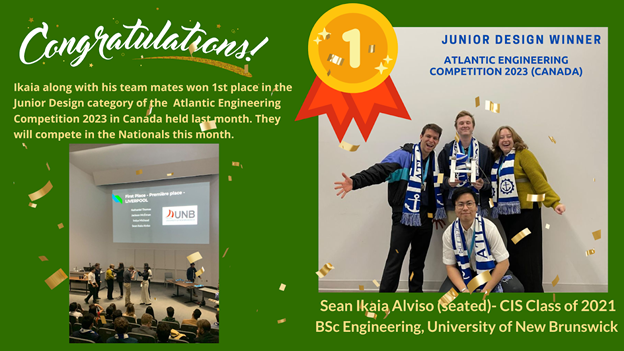
College Events (Virtual and Face to Face)
DATE
February 10
Friday
9:15 – 10:00 AM
Canteen Annex
EVENT
Istituto Marangoni (Italy) – Face to face info session with the university rep: Learn all about the programs and application process.

February 11
Saturday
1:00 – 2:00 PM
Link to register
SIM Global Roundtable Series: We have then gathered three (3) of our existing Filipino students to share their experiences and motivations in deciding to study in Singapore and at SIM. Get ready to meet Anne (SIM-University of London), Venus (SIM-University of Wollongong), and Micah (SIM) as they generously share their education journey “thus far” at SIM.

February 11
Saturday
11:00PM
Link to register
Engineering Innovation Pre-College Programs at Johns Hopkins: Are you ready to change the world through the power of engineering? Are you an intellectually curious high school student with an interest in math and science? Join this webinar to find out more.
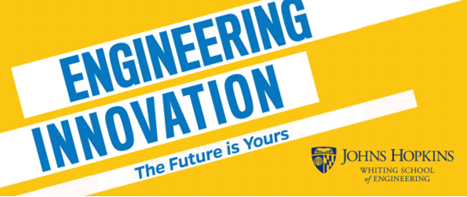
February 21
Tuesday
11:00PM
Link to register
Bocconi University – Don’t miss the chance to learn more about life at our Summer School by listening to past Students who share their experience, Faculty who are going to teach labs and Staff organizing the program.

SAT Update for 2022-2023
| SAT Test Date | Deadline for Registration, Changes and Regular Cancellation |
| March 11, 2023 (Digital) | February 24, 2023 |
| May 6, 2023 (Digital) | April 21, 2023 |
| June 3, 2023 (Digital) | May 19, 2023 |
Test dates labeled Digital means that students will bring a device to the test center and take the exam using their device. The College Board may provide devices for test-takers who do not have access to a device. All test-takers for Digital SATs are still required to report physically to the test center to take the test.
To register for the SAT, you may click on this link. If you need assistance or have any questions, please feel free to email Ms. Jenny Basa at jbasa@cis.edu.ph.



